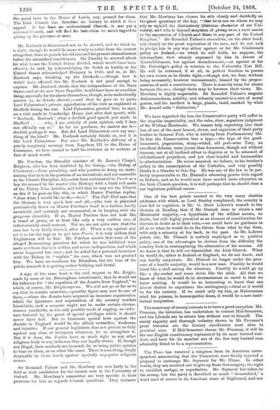Sir Roundell Palmer and Mr. Mowbray are now fairly in
the field as rival candidates for the vacant seat in the University of Oxford. Mr. Mowbray's committee are very specific in their promises for him as regards Church questions. They intimate
that Mr. Mowbray has chosen his aide clearly and decidedly on thegreat questions of the day, "that he-is-one on whom we may (rely to 'uphold the distinctively Direistian character of our Uni- versitty,end who is beyondsmspirion of giving even a tacit assent to the separation of Church sand State in any part of the United Kingdom." Sir Roundell Palmer's committee, on the other hand, rely simply on the great reputation of the man, and do not seek to pledge him in any way either against or for Mr. Gladstone's policy on Ireland,—on which he still holds, we suppose, the intermediate view already expressed by him in favour of disestablishment, but against disendowment,—or against or for Mr. Coleridge's policy in relation to the University Test Bill. He will be returned, if at all, in perfect freedom to pursue his own course as he thinks right,—though not, we fear, without being necessarily, however unconsciously, biassed by the prepos- sessions of such a constituency. There is scarcely room for choice between the men, though there may be between their views. Mr. Mowbray is highly respectable. Sir Roundell Palmer's singular disinterestedness, nobility, and urbanity amount to a sort of moral genius, and his intellect is large, plastic, lucid, marked by what Mr. Arnold calls " distinction."


































 Previous page
Previous page